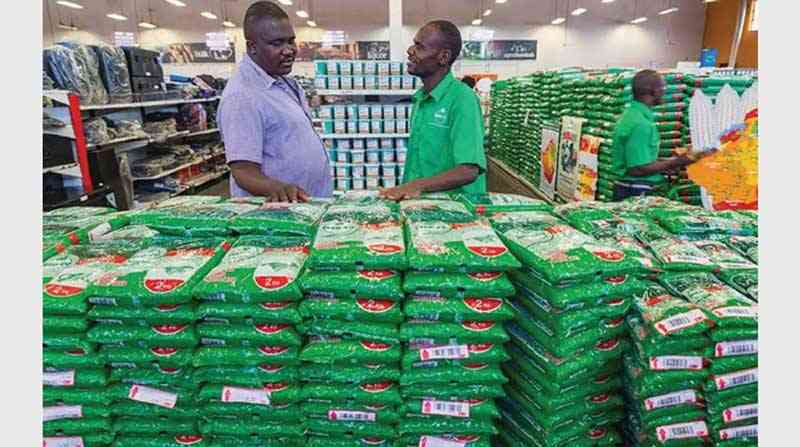
The Zimbabwe Stock Exchange-listed seed manufacturing giant, Seed Co Limited cautioned that the expected El Niño induced drought is putting pressure on grain sales volume, especially maize. In a presentation to analysts accompanying the financial results for the half year to 30 September 2023, the company reported that overall volumes had taken a 3% knock to 8,572 metric tons versus the comparable period.
Seed Co Limited which has a rich history dating back to 1940 has grown to become a Pan-African household brand.
Via its associate, Seed Co International, the brand has penetrated across Africa with operations now in 15 countries including Zambia, Tanzania, Malawi, Kenya and Mozambique amongst others.
Maize seed has predominantly been the flagship product for the company and generally contributes the lion’s share towards the top line. In the period under review, it was ravaged by the slow start of the government-related input support schemes coupled with the expected El Niño-induced drought resulting in a 22% tumble in sales volume.
In the previous reporting period, maize had also witnessed a 45% drop from the HY22 levels.
Over the years there has usually been a notable trend where in election years, a high sales volume of grain is recorded, as grain is used in most African markets as a primary campaigning tool. Zimbabwe recently held its elections early this year and part of the campaign period coincided with the period under review.
However, general spending in the period leading to the plebiscite was restricted and even the seed uptake was not as significant as shown by the declining volumes.
Another significant contributor to the top line of the company after maize and soya is wheat, which recorded a 6% recovery in sales volume although still to reach the HY22 levels of 6,430 metric tons.
- Seed Co muscled out of Pfumvudza
- Cricket reaps benefits of fan engagement initiatives
- SeedCo records 14% growth in volumes
- Seed Co eyes DRC market
Keep Reading
This comes at a time when Zimbabwe was reported to have recorded a record-breaking 465,000 tonnes of wheat, much of which was private-sector financed. Barley also witnessed a 21% mainly due to its drought tolerance characteristics.
Seed Co Limited which primarily serves the local market, was also impacted by power outages, as the backup alternatives are way costlier compared to the grid.
Financing costs have since reduced by 29% compared to the previous year, however, the numbers are in a currency that is ravaged by inflation are should be looked at with caution.
As a percentage of turnover, the finance costs were 16% as compared to 57% in the comparable reporting period.
Investments in associates
In contrast to the slow start for the Zimbabwean market, Seed Co International witnessed a 20% rise in maize seed sales buoyed by outstanding volumes in Tanzania, Mozambique, Zambia and Malawi.
The good rains and early seed uptake in Zambia were key in achieving the 24% sales volume increase, whilst the government fertilizer subsidy program in Tanzania also worked in favour of the international associate.
The Botswana domiciled Seed Co Int has also been increasing its footprint in Africa with business development reported in Ethiopia where the pilot production was scaled up and 750mt yield is anticipated.
Business in Angola was also reported to be slowly picking up after the government suspended grain support schemes due to budgetary constraints.
Analyst’s opinion
Overall, counters with exposure to the agriculture sector started the year with a stellar performance which could be linked to the above-average rains received in the previous agricultural season.
However, that might be about to change as we approach 2024 with the looming drought. Seed Co Limited has recorded a 1054% price change since the beginning of the year.
Its local currency-denominated financials make it difficult to make sense out of although its gross profit margin improved by 4 percentage points.
The investments in associates and other joint ventures such as Quton Zim will likely reduce the risk associated with the local environment, especially given the other African markets. Locally a 30% withholdings tax on farmers that was proposed in the budget will most likely impact the farming activities negatively, especially at a period when a drought is expected.
From an investor’s perspective, I opine that you are better off with exposure in Seed Co Int due to the various markets that they play in and that hedges natural events like droughts. I also see great potential in the pan-African business as it continues its business development and ventures into new territories.
- Hozheri is an investment analyst with an interest in sharing opinions on capital markets performance, the economy and international trade, among other areas. He holds a B. Com in Finance and is progressing well with the CFA programme. — 0784 707 653 and Rufaro Hozheri is his username for all social media platforms.






